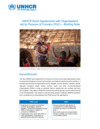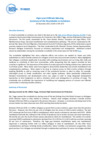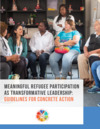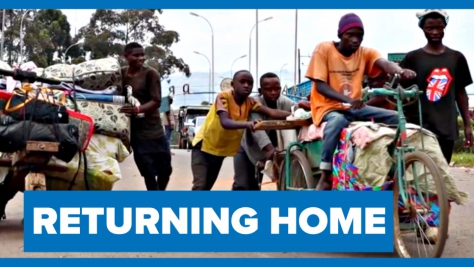Return of 2,400 Somali refugees leads to closing of third camp in Ethiopia
The voluntary return of more than 2,400 Somali refugees last week brings to more than 50,000 the number of voluntary repatriations last year and leads to the closing of a third refugee camp in Ethiopia.

ADDIS ABABA, Ethiopia, Jan. 2 (UNHCR) - The repatriation of thousands of Somali refugees from Ethiopia has continued at a steady pace, reflecting a more stable situation in parts of the east African country and leading to the closing of three of eight refugee camps.
Two convoys last week repatriated 2,412 people from Ethiopia's Daror camp to north-west Somalia, bringing the total number of refugees who returned home in 2001 to 50,216. The latest returnees received a nine-month food ration, plastic sheeting and blankets to help them restart their lives.
The Daror complex, which includes health clinics, schools, water systems and generators, and which once hosted 50,000 refugees, will be handed over by UNHCR to the local community.
Earlier last year, Teferiber and Dawarnaji camps were also closed.
Another estimated 67,000 Somalis who fled following the outbreak of widespread civil war a decade ago remain in five other camps in Ethiopia. More than half are expected to return home by June, but some 30,000 others from southern Somalia cannot be repatriated because the security situation in that part of the country remains unstable.
Related news and stories
Thousands of newly arrived Somali refugees in Ethiopia relocated to new settlement
Samira's Story
Drought brings life-threatening food shortages for refugees in Ethiopia
100,000 new Somali refugees arrive in Ethiopia in the past month, UN and partners are calling for urgent funding
UNHCR teams and partners rush assistance to some 100,000 newly arrived Somali refugees in hard-to-reach area of Ethiopia
As the Horn of Africa drought enters a sixth failed rainy season, UNHCR calls for urgent assistance
-

UNHCR Grant agreements with organizations led by displaced and stateless persons - Briefing Note
10 Dec 2021 The new UNHCR Grant Agreement for organizations seeks to ensure that displaced and host communities are treated as equal and active partners. It provides grant funding to organizations led by displaced and stateless persons in order to empower them to realize their own projects and build their capacity. It also allows UNHCR to work directly with the people it serves without having to use intermediaries. -

Summary of Roundtable 5: Solutions
10 Dec 2021 This document summarizes the roundtable on solutions, the fifth of a series of five preparatory roundtables to be held in the lead-up to the High-Level Officials Meeting. -

Deadly clashes over scarce resources in Cameroon force 30,000 to flee to Chad
10 Dec 2021 -

Meaningful Refugee Participation as Transformative Leadership: Guidelines for Concrete Action
10 Dec 2021 This Guidance was drafted by the Global Refugee-led Network in advance of the Global Refugee Forum in 2019. It identifies challenges and gaps to implement refugee participation, while providing guidance on how stakeholders can ensure participation is meaningful. -

Refugee-led innovations during COVID-19
10 Dec 2021 UNHCR dedicated its 2020 NGO Innovation Award to Refugee-Led Organizations (RLO) that developed creative responses to support their communities during the COVID-19 pandemic. Through this Award, UNHCR wishes to showcase the leadership and crucial contributions of these RLOs in supporting their communities, and thus, demonstrate the need to expand and strengthen our partnerships with them. This publication features the work of 20 organizations, including the 7 winners. -

Document library
-

Congolese refugees torn between returning home or remaining in exile
9 Dec 2021 -

Linked and side events for GCR stakeholder groups and initiatives
9 Dec 2021 Timetable for the linked events and side events, which are being held virtually on 13 December for GCR 2021 stakeholder groups and initiatives. -

Amid rising needs, partners seek US$1.79bn for Venezuelan refugees and migrants
9 Dec 2021 Joint UNHCR/IOM Press release
